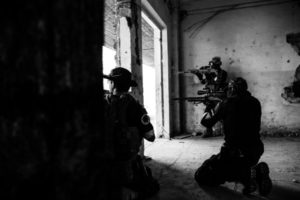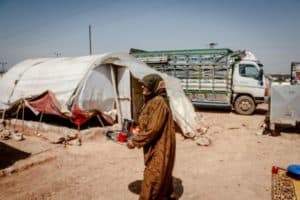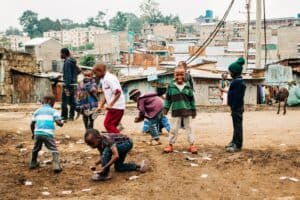This page contains affiliate links. This means if you a follow a link and make a purchase, at no additional cost to you, Humanitarian Careers will receive a commission. Thank you for supporting the site.
Working in the field is a key part of a career in humanitarian aid. Humanitarians use the term ‘field’ to describe the location where aid is delivered. To build a career in the humanitarian sector it is crucial to gain experience working on the front-line and NGO’s highly value aid workers with significant field experience. If you’re looking to work in international aid, target these field jobs to be at the fore-front of humanitarian responses.
Field Manager
The role of Field Manager is one of the main humanitarian field jobs. The Field Manager is responsible for managing a humanitarian NGOs base of operations within a set-location. The Field Manager’s job is to have oversight of all humanitarian activities at the field base, as well as management of the support functions such as Finance, Logistics and Human Resources. The Field Manager is the most senior position in a humanitarian NGO’s field base.
Humanitarian Field Managers are key frontline staff for NGOs in the field. With overall management of the field base, the Field Manager is responsible for ensuring aid activities are implemented, establishing the strategic direction of the field base and directly managing the field team. The job of Field Manager on a humanitarian mission is also to be finally responsible for safety and security of the staff and operations at the field base.
Logistics Coordinator
The job of Logistics Coordinator is the most senior logistics role working in the field on a humanitarian mission. The Logistics Coordinator often covers multiple field bases and is responsible to ensuring effective procurement, warehousing and transportation of aid. The role of Logistics Coordinator is responsible for managing the logistics team in the field. The job of humanitarian Logistics Coordinator also manages the fleet of vehicle the NGO has across its field bases.
The Logistics Coordinator is a crucial field role within a humanitarian mission. Responsible for ensuring aid is bought and delivered as required, whilst also working to ensure logistics processes are adhered too. The job of humanitarian Logistics Coordinator sits within the senior management team of an NGOs field mission as is responsible for overall management of the humanitarian supply chain. The Logistics Coordinator is the main front-line logistics management role based in the field of a humanitarian mission.
Security Officer
Security Officers manage the day-to-day safety and security at a humanitarian field site. Stationed within the field office, the Security Officer is responsible for ensuring the security of all staff, premises and humanitarian activities ran from the field base. The Security Officer is line-managed by the Field Manager but receives technical support from the Security Manager often based in the country’s capital. The job of Security Officer is the main safety and security focal point for each field base on a humanitarian mission.
The role of Security Officer is the primary safety and security humanitarian field job. The Security Officer is responsible for developing and maintaining the field bases security plans and procedures. They also monitor the security context in the field location and update the team regarding safety and security. When humanitarian workers move to new sites for distributions or to set-up projects, the Security Officer completes an assessment of the security situation. The Security Officer is the main frontline security humanitarian field job.
Team Leader
The Team Leader is usually the most senior humanitarian field job. Responsible for a humanitarian NGO’s mission in a specific location, the Team Leader oversees all aspects of the response. Often covering multiple field bases, the job of Team Leader is to ensure the humanitarian programmes successful implementation. They also line-manage other senior positions in the field such as Logistics, HR and Finance Managers, as well as programme management staff.
Leading the field work, the Team Leader in humanitarian response reports either to the Country Director in the capital or the Desk Officer in HQ. The Team Leader’s job is to ensure the strategy of the humanitarian response is met, whilst overseeing all operational aspects. The Team Leader is also the most senior representative of the NGO in the field and often meets with other humanitarian stakeholders such as partner NGOs, local governments or military actors. Team Leader is one of the top humanitarian field jobs.
Humanitarian Aid Online Courses
If you are looking to work in the field as a humanitarian, we highly recommend the online course International Humanitarian and Development Careers. We think it provides one of the best overviews of the humanitarian sector and gives valuable insights for those searching for jobs in humanitarian aid. Follow the link to the course’s page for more information.
The International Humanitarian Law Theory and Practice online course offered by Leiden University in the Netherlands provides a fantastic theoretical overview of humanitarianism. We think it’s one of the top online courses for those who want to understand the basics of international humanitarian law. Click the link to visit the course’s page for more information.
We also think the Humanitarian Action Response and Relief online course offered by Coventry University is a must for anyone looking to become a humanitarian aid worker. It only takes around three weeks to complete and would be a major addition to the CV of anyone looking to work in the aid sector. The link is to the course’s page.
Supply Chain Officer
Supply Chain Officer is the main field role responsible for logistics implementation on a humanitarian mission. The job of Supply Chain Officer is to ensure the effective sourcing, moving and storing of aid at the field site, known as the Supply Chain Cycle. On most humanitarian missions, a Supply Chain Officer is based in each field. The Supply Chain Officer is usually line managed by the Logistics Coordinator based in the country’s capital. Supply Chain Officer is the primary field-based humanitarian job responsible for supply chain management.
The job of the Supply Chain Officer based in the field is to manage all stages of the supply chain of humanitarian aid at the base. The Supply Chain Officer covers procurement at field-level, as well as supporting warehousing and shipments. The position of the humanitarian Supply Chain Officer also often line-manages the warehouse staff, drivers and housekeepers at the field base. If you want to a humanitarian field job in logistics and supply chain management, Supply Chain Officer is a good option.
Community Health Worker
Community Health Worker is the main front-line field job working in health in a humanitarian response. Community Health Workers come from the community affected by disasters and conflict and their job is to promote health and improve access to medical facilities. As one of the main humanitarian field jobs in the health sector, Community Health Workers directly support populations by providing healthcare and assessing the medical needs. Community Health Workers are one of the main field-based humanitarian health jobs.
Community Health Workers are recruited to work within their community and often work going door-to-door to provide health promotions or deliver services. A key field role for any medical humanitarian response, the job of Community Health Worker also provides the humanitarian NGO with key insights into the community’s health needs, the population dynamics and cultural practices. The position of Community Health Worker is the one of the main frontline humanitarian field jobs.
Distribution Manager
Distributions Manager is the humanitarian field job responsible for overseeing the implementation of aid distributions. Many types of humanitarian aid are delivered to beneficiaries using a variety of distribution methods and the position of Distribution Manager is to ensure the correct methods are used for the type of aid. Their job is also to plan, manage and ensure the smooth-running of aid distributions at the field site. Distribution Managers are the lead job for the final delivery of aid in the field.
The job of Distribution Manager within a humanitarian mission is to asses the type of aid being delivered to design distribution methods for the correct field contexts. For example, food, water, hygiene kits, shelter materials and cash all need different types of distributions. The role of Distribution Manager must also ensure the correct people receive the aid when it is given. The job of Distribution Manager is a key role is delivering aid in the field.
Finance Admin Officer
The Finance Admin Officer is responsible for the implementation of a humanitarian NGOs financial processes in the field. The job of Finance Admin Officer is to manage the field locations cash handling, invoicing, payments and cash-flow. They are also responsible for managing the field bases budget, working closely with the Field Manager. On a humanitarian mission, the field base Finance Admin Officer is directly managed by the Finance Admin Coordinator.
Generally, the Finance Admin Officer ensures the smooth financial management of the humanitarian programming at field level. On smaller humanitarian missions, the Finance Admin Officer also has responsibility for human resource management at the field base. The Finance Admin Officer is the main field humanitarian job dealing with the administrative running of the field base as well as providing day-to-day financial support to the aid projects.
Monitoring and Evaluation Officer
The Monitoring and Evaluation (M&E) Officer is the field position responsible for completing analysis of the humanitarian response. The M&E Officer collects data related to aid delivery and beneficiaries, as well as storing data and developing evaluations of the humanitarian action. Large humanitarian missions will have an M&E Officer in each field base. The M&E Officer is line-managed by the M&E Coordinator, often based away from the field.
The job of Monitoring and Evaluation Officer in the field is to ensure the humanitarian response is achieving it’s aims. In many NGOs, the M&E Officer is also responsible for making sure the humanitarian response is accountable to both beneficiaries and donors, as well as overseeing organisational learning. This position is known as MEAL Officer (monitoring, evaluation, accountability and learning) and is also a key field-level position responsible for evaluating the humanitarian action.
Shelter Advisor
Shelter Advisor is the top humanitarian field job responsible for coordinating shelter projects. People affected by conflicts and disasters often require shelter and humanitarian NGOs run programmes providing materials, accommodation or camps to people in need. The Shelter Advisor working in the field provides technical advice for the shelter programme. The work of the Shelter Advisor includes overseeing all aspects of the humanitarian NGOs shelter response in the field.
Like many technical roles, the position of Shelter Advisor within a humanitarian NGO may cover many field sites. Large humanitarian responses with significant shelter needs may have Programme Officers as part of the shelter programme in the field who are line-managed by the Shelter Advisor. The Shelter Advisor’s job is to oversee the shelter programme in the field, including budgeting, technical guidance, planning, monitoring and liaising with relevant teams like Logistics and Grants. The Shelter Advisor is the main humanitarian field job responsible for shelter provision.
Nutrition Manager
The position of Nutrition Manager is the main field-based nutrition job in a humanitarian response. Many humanitarian NGOs run nutrition programmes, especially targeting infant and young-child feeding (IYCF) and mothers. The job of the Nutrition Manager is to oversee the programme at the field site, ensuring technical quality as well as strong project management. Nutrition Manager is the leading humanitarian field job within the nutrition cluster.
Responsible for all aspects of the humanitarian NGOs nutrition programme at field-level, the nutrition manager oversees all aspects of the project’s implementation. The position of Nutrition Manager is also line-managing the nutrition project staff in the field, including project officers, IYFC-E councillors and community health workers. The job of Nutrition Manager must also responsible for reporting, monitoring and financial oversight of the NGO humanitarian nutrition projects in the field.

Medical Coordinator
The Medical Coordinator is the most senior technical medical job based in the field. The job of the Medical Coordinator is to manage the humanitarian medical programme. This includes providing technical expertise and ensuring the quality of medical provisions, as well as manging medical staff, facilities and supplies. The Medical Coordinator often manages the programme across many field bases and is the main humanitarian medical field job.
The job of the Medical Coordinator is to implement the humanitarian medical programme. Based in the field, the Medical Coordinator is responsible for project management, as well as providing technical advice. Some humanitarian missions work with local health authorities and here the Medical Coordinator would work with local medical staff. Other humanitarian missions where local health infrastructure is weaker the Medical Coordinator’s job includes directly managing the humanitarian medical team in the field.
MHPSS Officer
Mental health is fast becoming a core area of humanitarian response. The position of Mental Health and Psycho-Social Support (MHPSS) Officer is the main humanitarian field job working in mental health. The job of MHPSS Officer is to run a humanitarian NGOs mental health programme, including trainings, supervisions and running mental health services. The MHPSS Officer’s job is also to manage the MHPSS Social Workers and Councillors.
The position of MHPSS Officer is the main field-based job working in a humanitarian mental health response. Most humanitarian NGOs will have an MHPSS Officer for each field base running MHPSS programmes. They will be line-managed by the MHPSS Coordinator usually based in the capital. The job of the MHPSS Officer is to oversee the day-to-day management of the humanitarian mental health programme at the field base.
Food Security and Livelihoods Coordinator
The position of Food Security and Livelihoods (FSL) Coordinator is to manage the humanitarian programme in the field focusing on access to food and the ability for people to provide for themselves and their family. The job of FSL Coordinator is based in the field and is responsible for assessing the food and livelihoods needs, designing interventions, overseeing project implementation and monitoring its impact. In large humanitarian responses, the FSL Coordinator will oversee other field positions such as the FSL Officer or Project Manager.
FSL within a humanitarian response can cover many types of interventions. These can include cash transfers, food distributions and employment programmes. The role of FSL Coordinator is to be based in the field and access the correct type of intervention needed by the affected population. The position of FSL Coordinator is the main humanitarian field job responsible for running projects assisting people to rebuild their livelihoods and regain a secure access to nutritious and culturally appropriate food.
CCCM Manager
CCCM in a humanitarian response stands for Camp Coordination and Camp Management. The position of CCCM Manager is the main humanitarian field job responsible for managing refugee and IDP camps. When people are displaced by wars and disasters it is common for settlements and camps to be established for these people. NGOs who specialise in camp coordination will deploy into the field a CCCM Manager to oversee the establishment, running and eventual closure of refugee and IDP camps.
The job of CCCM Manager is often the most senior humanitarian field position responsible for camp management. Their role is to ensure services within the camp, such as food, water, hygiene, shelter and education are provided, as well as coordinate between humanitarian NGOs operating within the camp. In the field, each camp would usually have its own CCCM Manager responsible for overseeing it. The CCCM Manager is usually supported by field staff who assist in camp coordination.
Education Programme Manager
The Education Programme Manager leads the humanitarian education response in the field. The job is responsible for setting-up, running and ensuring quality of the education in emergencies programme. Many children affected by conflict and disasters lose access to education and so humanitarian NGOs set-up education projects to assist. The position of Education Programme Manager is the main humanitarian field job overseeing the technical aspects of the NGOs education project as well as providing project management expertise.
The job of the Education Programme Manager is to run the NGOs humanitarian education projects. This can include setting-up facilities, hiring teachers, sourcing curriculums, as well as grant writing, reporting and financial management. Based in the field, the Education Programme Manager also often line-manages the Education Programme Officer. The role of Education Programme Manager is the main field-based education position within a humanitarian response.
Protection Coordinator
Humanitarian protection is a key part of many responses. Conflicts and disasters can increase vulnerabilities’, especially among certain population groups. The Protection Coordinator is the main humanitarian field job implementing protection programming. Humanitarian protection can include gender-based violence programming, child protection work, working with elderly and with people with disabilities. Many protection coordinators working in the field specialise in one area of humanitarian protection.
The job of Protection Coordinator is to establish protection mechanisms for vulnerable groups, as well as set-up the humanitarian protection programme in the field. The Protection Coordinator line-manages the protection team, which make-up can change depending on the specific protection needs in the crises. The job is also responsible for project cycle management of the protection programme. The Protection Coordinator is the most senior humanitarian projection job in the field.
If you want to learn more about how to work in the field as a humanitarian worker, explore our list of the top humanitarian aid online courses here.





